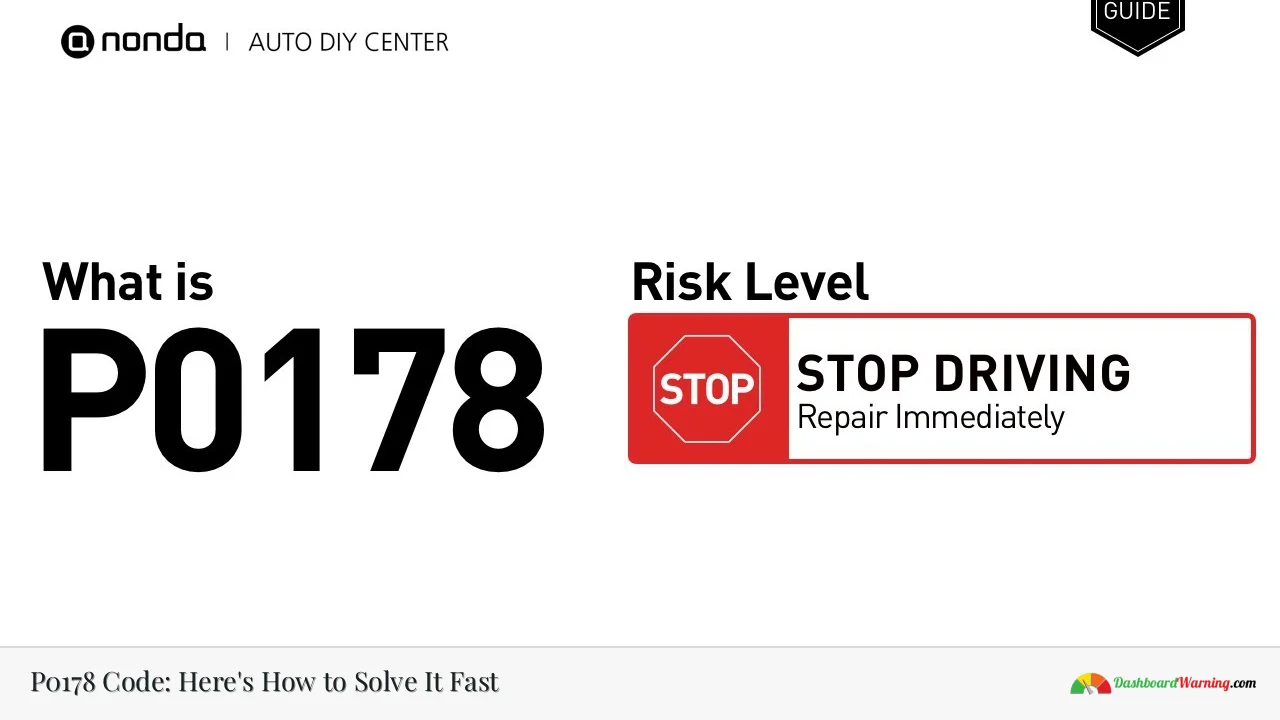The P0178 trouble code is a diagnostic trouble code (DTC) that indicates an issue with the fuel composition sensor circuit, specifically that the signal voltage is lower than expected. This code is primarily associated with vehicles equipped with flexible fuel systems, which can use varying blends of ethanol and gasoline. When the engine control module (ECM) detects a low voltage situation within the fuel composition sensor circuit, it triggers the P0178 code. Understanding this code is essential for vehicle owners and DIY mechanics, as it can lead to reduced engine performance, increased fuel consumption, and potential long-term engine damage if not addressed promptly.
| P0178 Code Meaning | P0178 Code Common Causes |
|---|---|
| Fuel Composition Sensor Circuit Low | Faulty Fuel Composition Sensor |
| Low Voltage Detected in Sensor Circuit | Damaged or Corroded Wiring |
| Inaccurate Ethanol Content Readings | Faulty Powertrain Control Module (PCM) |
| Potential Fuel Quality Issues | Outdated PCM Software |
| Electrical Connector Problems | Contaminated Fuel |
Symptoms of P0178 Code
When the P0178 code is triggered, you may experience several symptoms that indicate an underlying issue with your vehicle's fuel composition sensor circuit. These symptoms include:
- Illuminated Check Engine Light
- Poor engine performance or stalling
- Increased fuel consumption
- Difficulty starting the engine
Recognizing these symptoms early can help prevent further complications and costly repairs.
Technical Explanations
The fuel composition sensor measures the ratio of ethanol to gasoline in flexible fuel vehicles. It sends this information to the ECM, which adjusts fuel delivery and ignition timing accordingly. If the sensor detects a low voltage signal, it may indicate that the ethanol content is lower than expected, leading to incorrect adjustments by the ECM.
The normal operating frequency of a functioning fuel composition sensor typically ranges between 50–150 Hz, with pulse widths between 1–5 milliseconds. If the signal falls below 45 Hz, the ECM will register a P0178 code.
Step-by-Step Diagnosis
Diagnosing a P0178 code involves a systematic approach:
- Use an OBD-II Scanner: Connect an OBD-II scanner to retrieve the specific codes and freeze frame data.
- Visual Inspection: Check all wiring and connectors associated with the fuel composition sensor for any signs of damage or corrosion.
- Test Voltage: Use a multimeter to check the voltage at the sensor connector. The expected voltage should be around 5 volts.
- Sensor Testing: Disconnect the sensor and test its resistance and output signal according to manufacturer specifications.
- Check PCM: Investigate whether there are any additional trouble codes related to the PCM and ensure it is functioning correctly.
Solution Methods
If you have diagnosed a P0178 code, here are potential solutions:
- Replace Faulty Fuel Composition Sensor: If testing indicates that the sensor is malfunctioning, replacing it is often necessary.
- Repair or Replace Damaged Wiring: Address any damaged or corroded wiring that could be affecting signal transmission.
- Update PCM Software: If outdated software is suspected, consult your vehicle's service manual for instructions on updating the PCM.
- Clean or Replace Fuel: Ensure you are using high-quality fuel; contaminated fuel can lead to erroneous readings from the sensor.
Cost Estimates
Repair costs for addressing a P0178 code can vary significantly based on labor rates and parts prices in your area:
- Fuel Composition Sensor Replacement: $200 - $600 (including parts and labor)
- Wiring Repairs: $100 - $300 depending on extent of damage
- PCM Software Update: $50 - $150 if performed at a dealership or qualified shop
- Fuel System Cleaning: $50 - $150 if contaminants are found
Warnings and Recommendations
- Always ensure you are using reputable fuel sources to avoid contamination issues.
- If you are not confident in diagnosing or fixing electrical issues, seek professional assistance to avoid further damage.
- Regular maintenance checks can help catch issues early before they escalate into more significant problems.
Frequently Asked Questions About P0178
- What does P0178 mean?
P0178 indicates that there is a low input from the fuel composition sensor circuit, which affects how your vehicle manages its fuel mixture. - Can I drive my car with a P0178 code?
While it may be possible to drive short distances, it's not recommended as it can lead to poor performance and increased emissions. - How serious is a P0178 code?
The severity of this code is moderate; ignoring it can lead to further engine issues. - What causes a P0178 code?
The most common causes include faulty sensors, damaged wiring, or issues with the powertrain control module. - How do I fix a P0178 code?
Fixing this code typically involves replacing or repairing faulty components in the fuel composition sensor circuit. - Can bad gas trigger a P0178 code?
Yes, contaminated or poor-quality fuel can lead to inaccurate readings from the fuel composition sensor. - Is professional help needed for P0178?
If you're unsure about diagnosing electrical issues, it's advisable to consult with a professional mechanic. - How much does it cost to fix a P0178 code?
The cost can range from $200 to $600 depending on what repairs are needed.
In conclusion, understanding and addressing the P0178 trouble code promptly can save vehicle owners from more severe problems down the line. By following proper diagnostic steps and knowing when to seek professional help, DIY mechanics can effectively manage this issue while ensuring their vehicle operates efficiently.
Was this page helpful?


More important content about Engine Codes
P2419 Code: Here's How to Solve It Fast
P0090 Code: Here's How to Solve It Fast
P1717 Code: Here's How to Solve It Fast
P0313 Code: Here's How to Solve It Fast
P1405 Code: Here's How to Solve It Fast
Tips and Advice
Porsche Cayenne Years To Avoid
Subaru Legacy Years To Avoid - 5 Worst Years
Pt Cruiser Years To Avoid
Use 5w30 instead of 0w20 - Advantages and Disadvantages
Tractor Dashboard Symbols And Meanings
Suzuki Sx4 Years To Avoid - 5 Worst Years